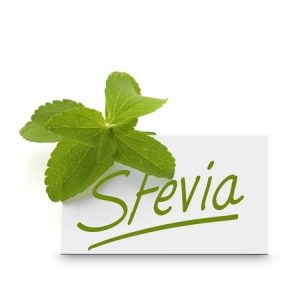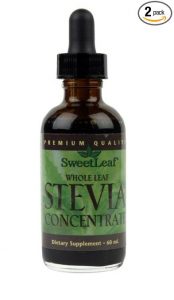“The herb that can’t be got is the one that heals.”
– Irish Saying

When I was teaching at The University of North Texas in the early 1990s, a student brought me some bags of this new, and unknown at that time, sweetener stevia.
I had never seen authentic stevia in the raw, and I was exhilarated to learn about this new “safe sweetener.”
What I didn’t expect, however, was looking like a drug dealer as I walked across campus holding a clear bag of dried, green stevia leaves in my left hand, and a bag of white powdered stevia in my right.
I’ve never been into “drugs”, so I naively boasted about my gifts – a new herb just off the boat from South America.
Needless to say, I got a lot of attention.
I had some explaining to do.
Stevia

By now, I’m sure you know that stevia is one of the safest sweetener choices, if not THE best choice for added sweetness.
Stevia is extracted from a plant grown in South America, and in its original form, stevia is a complex sugar from the plant itself.
This is what I consider a natural sucrose (sugar) substitute.
Stevia is a complex plant carbohydrate, so it does not pass into the bloodstream, yet it releases a natural sweetness.
Some people complain that stevia is bitter, but that is an easy problem to fix. Don’t use too much. It’s no different than seasoning a tomato with too much salt or pepper, or using too much garlic or oregano in lasagna.
Start off slowly, and add more if you wish.
Many of us are in the habit of spooning huge amounts of sugar into our tea or coffee, and I have seen people involuntarily pour the equivalent of stevia like it was refined sugar or an artificial sweetener substitute, like Equal® and Splenda®.
If you simply use one-quarter the amount of stevia for one serving of sugar, then the taste is pleasant, natural, and is not bitter.
The Politics Of Sweeteners
Stevia’s entry into the American sweetener market was suppressed by politics for many years, and this made many people wonder if it was safe or not. Well, history shows that stevia is absolutely safe, and not only is it safe, it may actually be healthy for you.
Stevia is 250 to 300 times sweeter than sugar when it is purified from the leaves of the stevia plant. Stevia has been used as a traditional remedy for diabetes and gum disease among the indigenous people of Paraguay and other South American countries for over 1,500-recorded years; who knows how many years prior to the records?
Scientific evidence performed by independent researchers shows that stevia can improve the function of the cells required for insulin production in the pancreas, and may also improve glucose tolerance in people with diabetes.
According to the generations who have used stevia in their daily diet in South America, stevia has been proven to regulate their blood sugar.
Unlike the other sweeteners, stevia is reported to possess anti-viral qualities. And, research shows that stevia has blood pressure lowering properties, making it a useful treatment for hypertension.
Can you imagine how awesome it would be if they put it in toothpaste?

Buy Pure
When you purchase stevia, make sure to buy the purest form available. It might be more expensive, but the fewer the ingredients, the purer it will be.
I always say that the less someone has handled it, the closer to its source and purity it will be.
_______________
If you want to learn more about healthy living and disease prevention, contact me at janethull.com. Remember that you are never alone when you are looking for good health!
Gain access to all of my online programs, ongoing support, monthly Q&A, and more by joining my Private Inner Circle Membership Program. I look forward to supporting you on your journey to alternative health and wellness.
_____________
Disclaimer: This article is for informational purposes only, and is educational in nature. The FDA may not have evaluated some of the statements. This article is not intended to diagnose, treat, cure, or prevent any disease. Please discuss with your own, qualified health care provider before adding supplements or making any changes to your dietary program.
Before taking vitamins, consult your doctor; pre-existing medical conditions or medications you are taking can affect how your body responds to multivitamins.
You have our permission to reprint this article if you attribute us with a live back-link to this article and the youtube links. https://janethull.com/